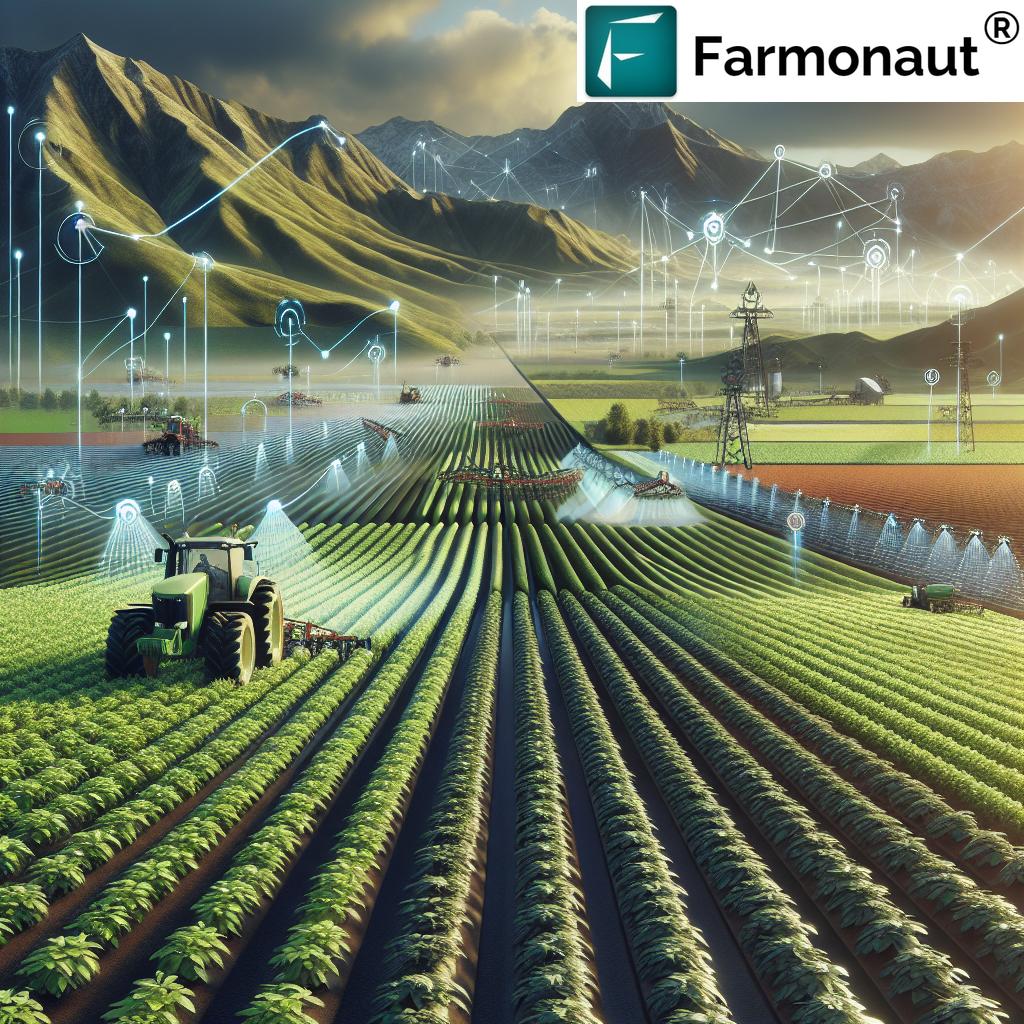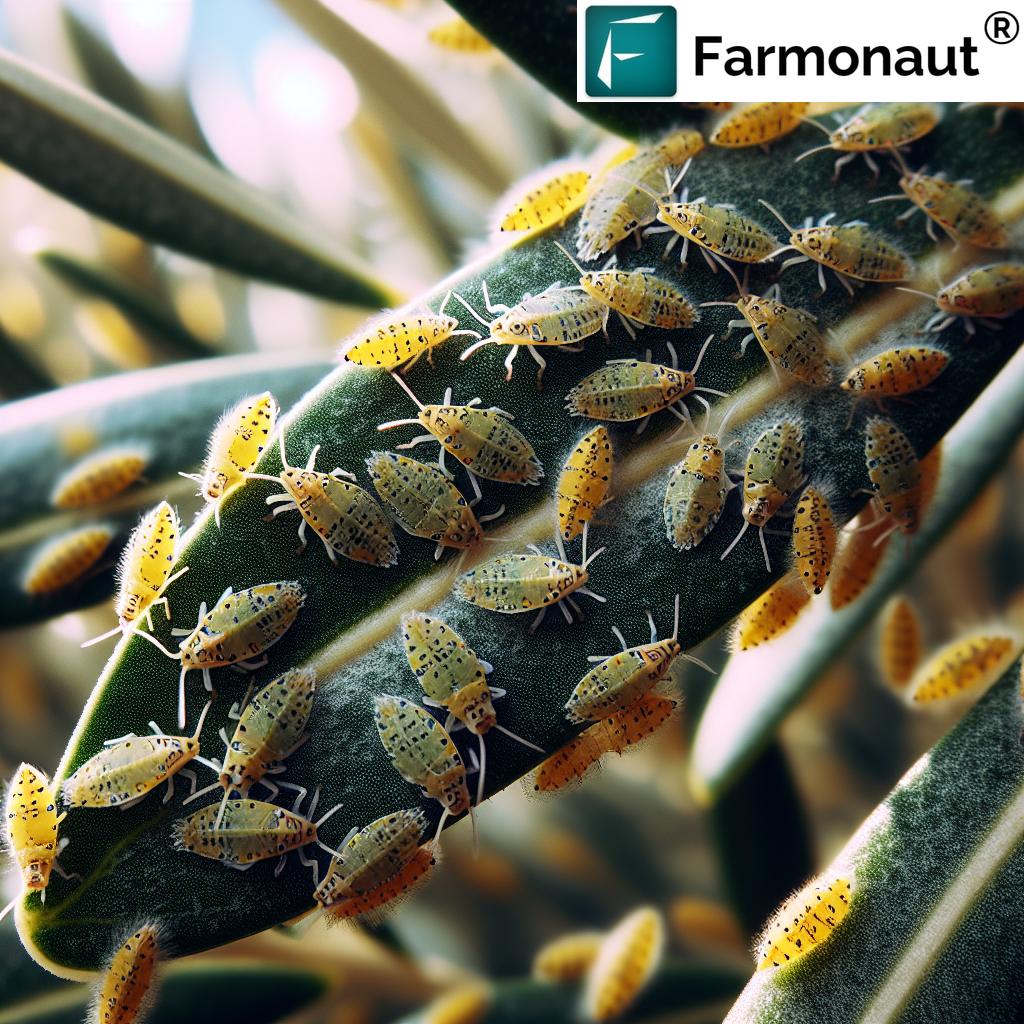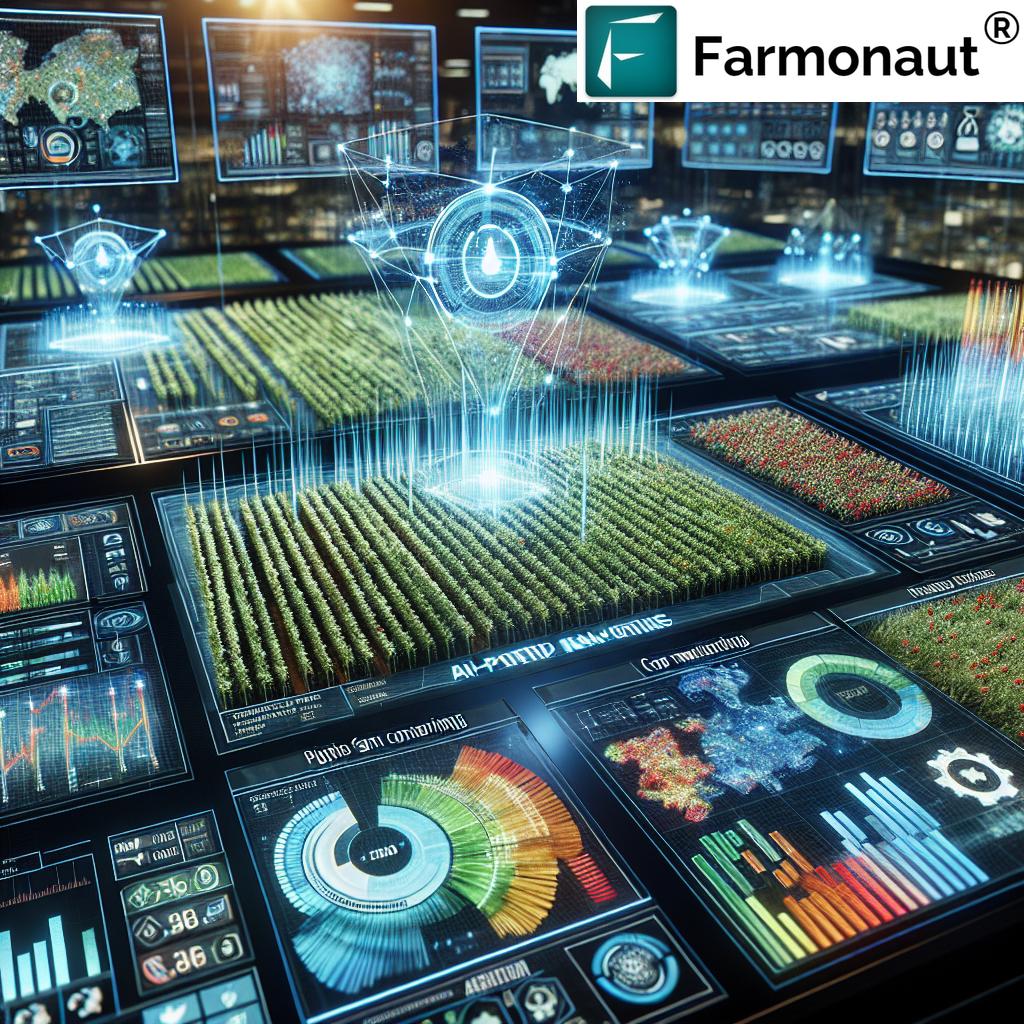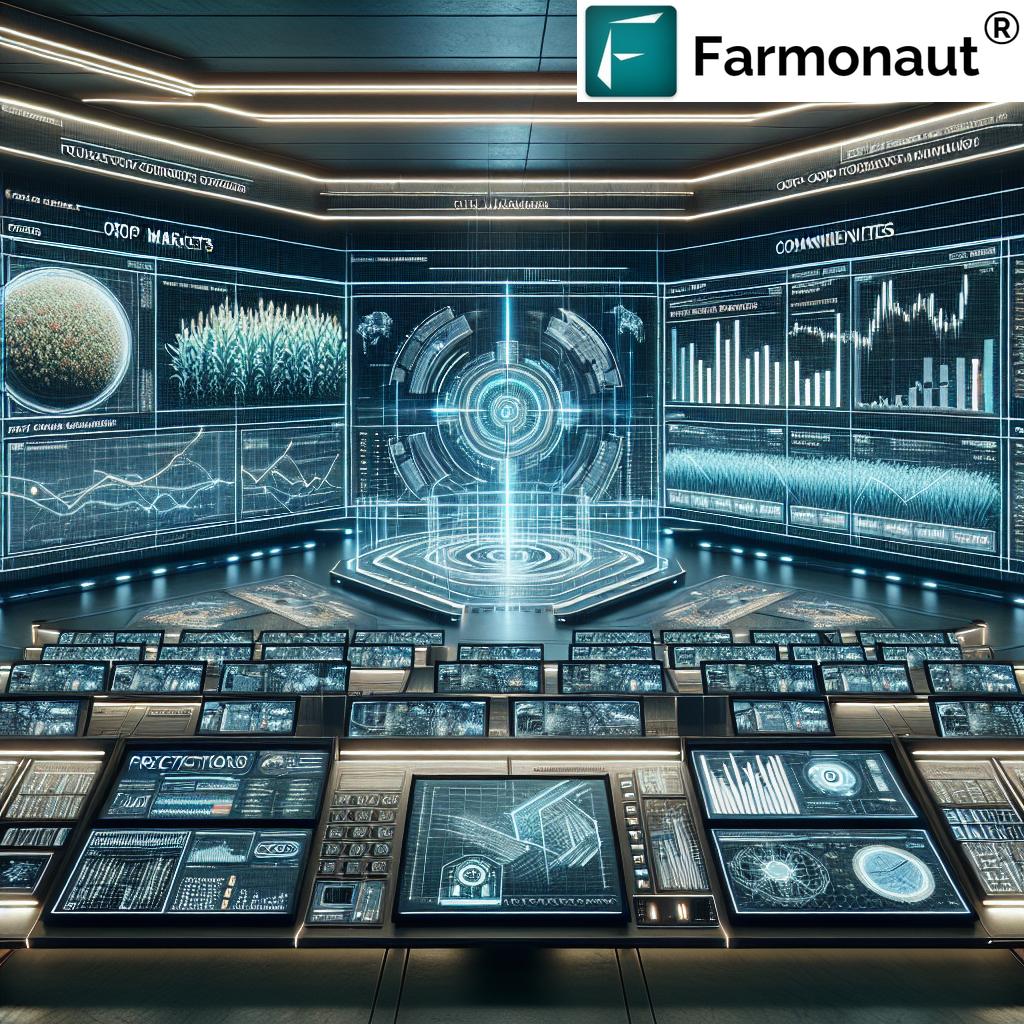Table of Contents
- Precision Farming Solution: Revolutionizing Agriculture
- Trivia: Yield & Irrigation Impact
- Key Components of Precision Farming
- Feature Comparison Table: Precision Farming Technologies
- 7 Powerful Precision Farming Solutions to Boost Yields
- Benefits of Precision Farming
- Farmonaut’s Advanced Precision Farming Technology
- Trivia: Smart Irrigation Systems Reduce Water Usage
- Future Trends in Precision Agriculture
- Overcoming Challenges in Precision Farming
- Precision Farming FAQ
- Conclusion
Precision Farming Solution: 7 Powerful Ways to Boost Yields
Focus Keyword: Precision Farming Solution
In the rapidly advancing landscape of agriculture, precision farming (sometimes referred to as precision agriculture) has emerged as a beacon of innovation. Leveraging advanced technologies like IoT sensors, smart irrigation, drone crop monitoring, automation, and robust data analytics, precision farming is transforming how we cultivate crops, manage resources, and drive sustainability. The integration of these precision agriculture technologies is empowering farmers to optimize efficiency, reduce costs, and improve yields—solidifying food security in an ever-changing global environment.
In this comprehensive guide, we will delve deep into the seven most powerful precision farming solutions that are revolutionizing the agricultural sector. Whether you are a smallholder seeking affordable solutions or an agribusiness aiming to maximize ROI, these approaches—rooted in data, automation, and sustainable practices—offer practical insights for modern farming challenges.
Read on to discover why adopting precision farming solutions is the smartest investment for your farm’s present and future productivity!
Key Components of Precision Farming
Precision farming combines a suite of innovative technologies and data-driven strategies to optimize agricultural practices, focusing on the specific needs of crops and livestock. Let’s explore the major pillars in modern precision agriculture technologies:
1. Variable Rate Technology (VRT)
Variable rate technology in agriculture enables the application of inputs (fertilizers, pesticides, and water) at optimal rates across different sections of a field. By analyzing spatial variability in soil properties, moisture levels, and crop requirements, VRT reduces waste and improves resource utilization.
2. Remote Sensing & Drones
Drones for crop monitoring—outfitted with multispectral cameras and sensors—generate aerial imagery to assess crop health, detect pest infestations, and monitor growth rates. Early monitoring allows farmers to apply timely interventions, minimizing yield losses.
3. IoT Sensors for Farming
With the proliferation of IoT sensors—including soil moisture sensors, weather stations, and climate monitors—farmers gain access to real-time data for smart irrigation scheduling, resource management, and predictive pest/disease control.
Discover affordable, satellite-based IoT insights via Farmonaut’s crop health monitoring platform.
4. Autonomous Farming Equipment
Autonomous farming equipment automates tasks like planting, spraying, weeding, and harvesting with GPS precision. These machines boost operational efficiency and mitigate labor shortages while ensuring task accuracy.
5. Smart Irrigation Systems
Smart irrigation systems connect IoT soil sensors and weather analytics to optimize water supply according to crop-specific needs and environmental conditions. Save water (up to 40%) and boost yields with real-time moisture monitoring and automated pump controls.
6. Advanced Data Analytics in Farming
Data analytics in farming harnesses big data, AI, and ML to turn raw information into actionable insights. From estimating yields to optimizing resource inputs, analytics enhances precision, decision-making, and profitability.
7. Integration & Connectivity
Effective implementation requires seamless integration between IOT devices, drones, satellites, and management systems. Scalability and continuous connectivity are prerequisites for real-time analysis—Empowering both small-scale and large-scale farms.
Access Farmonaut’s Large-Scale Farm Management solutions for centralized monitoring and analytics.
Feature Comparison Table: Precision Farming Technologies
| Technology | Description | Estimated Yield Increase (%) | Efficiency Improvement (%) | Sustainability Impact | Adoption Cost Estimate ($/acre) |
|---|---|---|---|---|---|
| Smart Irrigation Systems | IoT-enabled irrigation delivers water only as needed based on soil moisture and weather analytics. | +10–15% | Up to 40% | Water savings, reduced runoff | $30–100 |
| IoT Soil Sensors | Real-time soil moisture, nutrient and temperature monitoring for resource optimization. | +7–14% | Up to 30% | Reduces fertilizer/water waste | $15–40 |
| Drones for Crop Monitoring | Aerial imagery, pest detection, NDVI mapping, and crop health assessment. | +5–18% | 20–35% | Pesticide reduction, targeted sprays | $5–30 |
| Variable Rate Technology (VRT) | Applies fertilizers/pesticides at variable rates across a field. | +5–15% | 25–40% | Reduced chemical use | $10–50 |
| Autonomous Farming Equipment | Robotic tractors and implements for precise planting, weeding, harvesting. | +10–20% | Up to 50% | Reduces labor, fuel use | $60–250 |
| Data Analytics in Farming | Machine learning-driven recommendations for input use, pest and disease management. | +5–20% | 15–30% | Optimizes all resources | $15–75 |
| Remote Sensing (Satellites) | Satellite imagery for field-wide health monitoring and anomaly detection. | +8–16% | Up to 25% | Minimizes input waste | $5–20 |
7 Powerful Precision Farming Solutions to Boost Yields
Here are the seven most impactful precision farming technologies—each designed to boost productivity, cut operational costs, and unlock new benchmarks in sustainable agriculture:
1. Variable Rate Technology (VRT) in Agriculture
By analyzing spatial variability in fields using advanced sensors, soil maps, and AI-driven analytics, VRT customizes the application of inputs like fertilizers, pesticides, and water, matching the exact needs of each crop area.
- Benefits: Increases input efficiency and reduces waste
- Example: A wheat field showing low nitrogen zones can receive precisely adjusted fertilizer rates while minimizing overuse elsewhere.
- Environmental Impact: Reduces runoff, conserves natural resources, and improves soil health
Curious about remote, AI-backed crop health monitoring? Try Farmonaut’s platform for live field analytics.
2. Smart Irrigation Systems
Water scarcity is a major global challenge. Smart irrigation systems use weather forecasts, IoT soil moisture sensors, and AI algorithms to schedule watering exactly when and where crops need it.
- Benefits: Reduces water usage by up to 40% and streamlines labor
- Example: A tomato greenhouse maintains ideal moisture levels automatically without manual intervention
- Boosts Yields: Optimal hydration can improve yields by up to 15%
Did you know? Farmonaut’s satellite platform visualizes soil moisture and supports irrigation planning. Explore the app.
3. Drone Crop Monitoring
Using drones equipped with multispectral cameras, farmers get instant, high-resolution imagery for:
- Early detection of weed, pest, or disease outbreaks
- Tracking growth stages and identifying spatial variability
- Targeted input applications and timely interventions
This leads to efficient management, reducing crop losses and boosting yields.
4. IoT Sensors for Precision Farming
IoT-based sensors open a new window into real-time field conditions:
- Monitor soil moisture, texture, pH, nutrient levels
- Enable data-driven irrigation, fertilizer, and pesticide management
- Reduce manual surveys and human error
Pro tip: Real-time soil analytics helps us tailor interventions and minimize resource waste.
5. Autonomous Farming Equipment
Robots and autonomous machines can plant, weed, spray, and harvest with GPS-guided accuracy and minimal human intervention:
- Mitigate labor shortages and rising costs
- Operate 24/7 for enhanced operational efficiency
- Reduce overlap and input waste
Farmonaut’s fleet management solution optimizes machinery and logistics for both large and small farmers.
6. Advanced Data Analytics in Agriculture
Machine learning (ML) and artificial intelligence (AI) reveal patterns to:
- Forecast yield potential and input needs
- Spot anomalies before they impact output
- Deliver personalized, field-level recommendations
With Farmonaut’s Jeevn AI advisory, farmers receive custom real-time advice for maximizing productivity and tackling farm-specific challenges.
7. Blockchain Traceability and Farm Administration
Modern precision farming goes beyond the field—blockchain technology secures product traceability from farm to fork:
- Builds consumer trust through transparent supply chains
- Prevents fraud and improves quality assurance
- Unlocks market and financing opportunities
Ensure supply chain transparency and food safety with Farmonaut’s blockchain-based traceability solution.
Frequently Asked Questions (FAQ): Precision Farming Solutions
-
What is precision farming and how does it work?
Precision farming, or precision agriculture, uses technologies like sensors, drones, and data analytics to apply the right resource (water, fertilizer, pesticides) at the right time and place. This data-driven approach optimizes yields, reduces waste, and supports sustainability. -
Is precision farming suitable for smallholder farmers?
Absolutely! Many modern solutions—like Farmonaut’s satellite-based crop monitoring—do not require expensive hardware or large landholdings, making precision farming affordable and accessible to farms of all sizes. -
How do smart irrigation systems benefit agriculture?
Smart irrigation uses IoT soil moisture sensors and weather forecasts to provide water only when and where crops need it. This system reduces water usage, lowers costs, and promotes optimal crop health and yields. -
What are the main challenges of adopting precision agriculture?
Key challenges include high initial investment, technical complexity, data management, and connectivity issues in remote areas. Affordable platforms like Farmonaut help address these gaps with cost-effective, user-friendly solutions. -
What is variable rate technology (VRT) in agriculture?
VRT uses sensors and AI to apply inputs like fertilizer, water, and pesticides at variable rates across a field, based on real-time data and spatial variability. It reduces resource wastage and improves yields. -
How does drone crop monitoring work?
Drones, equipped with multispectral cameras, provide aerial images to assess crop health, detect pests, and identify issues early. Farmers use this data for timely interventions, reducing losses and boosting efficiency. -
Can precision farming help with regulatory compliance and financing?
Yes—Farmonaut’s blockchain-based traceability and satellite verification systems assist farmers in meeting compliance, securing loans and insurance, and building trust throughout the supply chain. -
Are these technologies environmentally sustainable?
Yes. By reducing input waste, minimizing chemical usage, conserving water, and optimizing operations, precision farming advances sustainable agriculture practices and environmental stewardship. -
Where can farmers access these solutions?
Platforms like Farmonaut offer affordable, app-based access to real-time crop monitoring, AI advisory, and farm management tools worldwide.
Benefits of Precision Farming Solutions
- Maximized Efficiency: Use resources only when and where needed, minimizing waste and maximizing productivity.
- Cost Savings: Cut down on fertilizers, pesticides, water, and manual labor costs with automation and tailored application.
- Environmental Sustainability: Reduce chemical runoff, conserve water, protect soil health, and lower carbon footprint.
- Improving Crop Yields: Informed, data-driven interventions lead to healthier crops and higher yields.
- Food Security & Economic Stability: Higher yields and cost efficiency support farm viability and food systems.
Farmonaut’s Advanced Precision Farming Technology
As a pioneer in the space, we at Farmonaut make precision agriculture accessible for every farmer. Our platform combines satellite imagery, AI-driven analytics, IoT data, and blockchain traceability—giving users real-time insights without costly hardware.
- Satellite-Based Crop Health Monitoring: Monitor NDVI, soil moisture, and vegetation health to optimize inputs. Learn more and try it free.
- Jeevn AI Advisory System: Our AI generates tailored advice, weather forecasts, and management tips for smarter farm decisions.
- Blockchain Traceability: Enhance supply chain transparency and compliance. Explore Product Traceability.
- Resource & Fleet Management: Efficiently track logistics and reduce operational costs. Fleet Management Solutions.
- Carbon Footprinting: Easily monitor emissions and reduce environmental impact. Our Carbon Footprint Tool.
- Crop Loan & Insurance Verification: Satellite-based verification for faster loan approval and safe insurance. See How It Works.
Our subscription-based packages fit individuals, farm collectives, businesses, and government agencies. Flexible pricing, mobile and web access, and robust support ensure our solutions scale with your needs.
Want to integrate satellite or weather data into your own system? Harness our robust API or deep-dive via our developer docs!
Future Trends in Precision Agriculture
- AI & Machine Learning: Custom analytics will forecast issues and optimize every field operation with precision.
- Robotics & Automation: Advanced machines will handle even complex tasks (weeding, selective harvesting) autonomously.
- Big Data Integration: Seamless analysis of data from IOT sensors, drones, and satellites for holistic farm management.
- Sustainable Agriculture Practices: Precision farming will be central in reducing greenhouse gases, conserving water, and enhancing soil health.
- Affordability & Accessibility: Satellite and mobile platforms (like Farmonaut) will continue to break barriers for every farmer, worldwide.
Overcoming Challenges in Precision Farming
While powerful, these solutions face practical hurdles:
- High Initial Investment: Upfront costs can be high, but app-based solutions like Farmonaut eliminate the need for expensive field hardware.
- Technical Complexity: Training and user-friendly platforms are required for wider adoption.
- Data Management: Handling vast volumes of farm data calls for secure, easy-to-use analysis systems.
- Connectivity Issues: Rural areas may require alternative approaches where internet is sporadic. Satellite-based solutions help bridge the gap.
Our mission at Farmonaut is to democratize precision farming and make these tools affordable and friendly for all farmers, regardless of size or location.
Conclusion: The Future of Precision Farming Solutions
Precision farming is a transformative approach for modern agriculture. By integrating advanced technologies—from IoT sensors to drones, smart irrigation, blockchain traceability, and big data analytics—farmers can optimize every hectare for maximum yields, higher efficiency, and true sustainability.
Farmonaut is proud to lead this revolution—empowering individual farmers, agribusinesses, and governments with affordable, scalable, and data-driven solutions for a resilient, profitable, and sustainable future. Ready to unlock the full potential of your farm? Try Farmonaut today and experience precision farming, redefined.
Farmonaut is a pioneering agricultural technology company, offering digital precision farming solutions to empower sustainable, efficient, and informed agriculture. We do not sell farm inputs or machinery―we deliver next-generation data, insights, and management tools directly to your device or organization!












